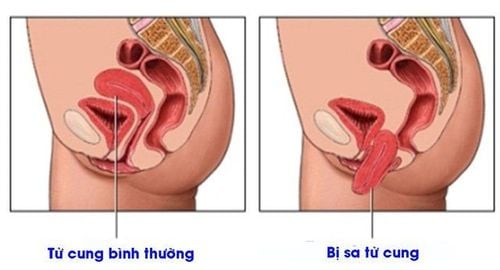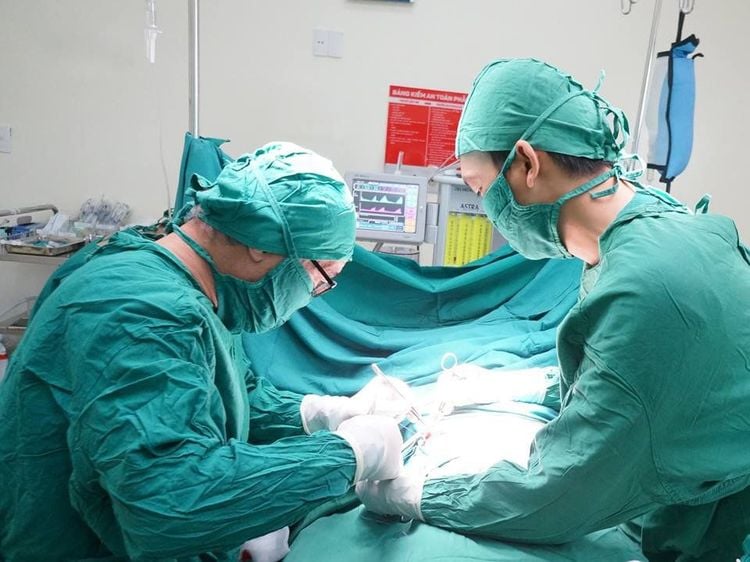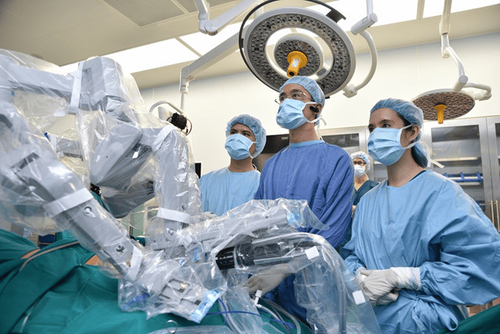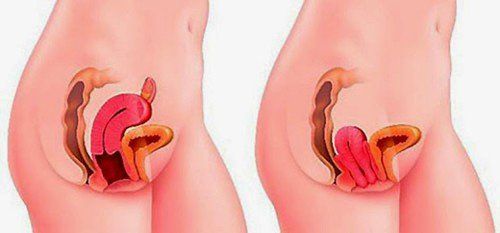This is an automatically translated article.
The article was professionally consulted by Specialist Doctor II Nguyen Thi Minh Tuyet - Head of Obstetrics and Gynecology Department, Vinmec Central Park International General HospitalCurrently, the rate of genital prolapse tends to decrease. However, there is still a significant percentage of women in the past who suffered from genital prolapse, which was found in women who have had many pregnancies, given birth early, delivered thickly, gave birth without proper technique, and did heavy labor. Genital prolapse affects many activities, work as well as quality of life. Surgery is a radical method of treating genital prolapse to bring back a normal life for the patient. So is genital prolapse surgery dangerous?
1. What is genital prolapse?
Genital prolapse is a phenomenon in which the uterus descends into the vagina or prolapses completely outside the vulva, often accompanied by prolapse of the anterior vaginal wall and bladder or the posterior wall of the vagina and rectum.Genital prolapse is a fairly common disease in women who have given birth, usually between the ages of 40 and 50 years old. The disease progresses slowly from 5 to 20 years, and after each birth, hard labor, poor health, the degree of genital prolapse becomes more and more severe.
The most common clinical symptom is the appearance of a mass in the genital area: enlarged when pushing, coughing, sneezing, walking; relief at rest accompanied by discomfort, heaviness in the lower abdomen. Other manifestations such as: urinary frequency, urinary incontinence, urinary incontinence, sometimes difficult defecation. Examination may reveal a mass in the vagina and vulva. The prolapsed mass may be keratinized or ulcerated by rubbing or superinfection.
Complications may be encountered such as cervical erosion, ulcerative prolapse, dysuria, urinary incontinence, urinary tract infection, difficult defecation, constipation.

2. Causes of genital prolapse
Genital prolapse is common in pregnant women. Women who have never been pregnant can also develop genital prolapse, which is usually a simple cervical prolapse. Causes can include:Multiple births, close interval between births, home birth, incorrect delivery technique, not knowing how to push, tearing the lower genital tract or tearing the perineum without sutures. . Heavy labor, labor soon after giving birth: After giving birth, the mother's body is greatly weakened, the mother does heavy labor, causing the abdominal pressure to increase when the organs are still weak and have not returned to normal, which easily leads to childbirth. sex. Congenital aetiology in women who have never given birth, in women there are changes in the anatomy and function of the genital organs. These cases are usually simple cervical prolapse. Nutritional disorders: People with chronic diseases, malnutrition, and the elderly are also prone to genital prolapse
3. Methods of treatment
Surgery is the mainstay of treatment for genital prolapse. Surgery is mainly vaginal.The purpose of surgery is:
Restoration of the uterine support system, lifting the bladder, rebuilding the anterior and posterior vaginal walls, suturing the levator anal muscle and reconstructing the perineum. Reconstruction of the vaginal walls is therefore cosmetic. There are many surgical methods of genital prolapse, but there are 3 commonly used techniques:
Manchester technique:
Indicated for women who are young, still want to have children and prolapse I or II. In addition, it is also indicated for elderly patients with grade III genital prolapse who cannot tolerate major surgery. Surgical steps in order: cervical amputation, Mackenrodt ligament shortening and bladder lift, cervical restoration Crossen technique:
Assign patients with grade III genital prolapse when the cervix is not inflamed ulcer. Complete hysterectomy through the vagina. Cross tie the Mackenrodt ligaments and the other round ligaments to hang the sutures together into a strong hammock against intestinal prolapse. Lefort technique:
Indicated in the elderly who no longer need to have sex, the vagina and cervix are not infected. Technique of suturing the vagina, leaving only the groove for the fluid to drain out, and at the same time lifting the bladder.

4. Is genital prolapse surgery dangerous?
Uterine prolapse surgery methods are safe and effective. The doctor prescribes surgery based on many factors such as age, fertility needs, sexual needs, systemic condition, degree of genital prolapse. out complications. Anesthesia method can be sedated by spinal anesthesia, so it is applicable to the elderly. The surgery time is not long, so there are few complications about anesthesia. It did not affect the overall condition much, the patient recovered quickly after surgery. Currently, there is also a laparoscopic surgery method with many outstanding advantages, less damage to nearby organs, less complications, less bleeding, quick recovery, early discharge from hospital, and reduced treatment costs. Normally, this surgery is often contraindicated in the elderly who cannot afford surgery, whose physical condition does not allow In the case of vaginal and cervical inflammation, it will be thoroughly treated before performing surgery, so it is safe to do so. Before surgery, the patient was fully assessed for factors such as age, physical condition, systemic diseases such as anemia, cardiovascular disease, respiratory disease, high blood pressure, diabetes ... review Preoperative treatment or some pathology is contraindicated, so patients can rest assured before their surgery decision. If you notice any unusual problems, you should visit and consult with a specialist.Please dial HOTLINE for more information or register for an appointment HERE. Download MyVinmec app to make appointments faster and to manage your bookings easily.














